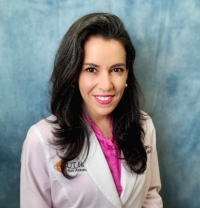Meet Dr. Monica Verduzco-Gutierrez, MD, FAAPMR

PM&R Chair, UT Health San Antonio Long School of Medicine
Current Opportunities: National Academies of Science, Engineering, and Medicine (NASEM) – Long-COVID Terms and Definition Development Workgroup; US Department of Health and Human Services (HHS) – Long-COVID Federal Advisory Committee
What has been your favorite part of being an Academy liaison?
My favorite part of being an Academy liaison to the NASEM is having a seat at the table where crucial decisions are made, ensuring the voice of physiatry is not only present but actively heard. As physiatrists, our deep expertise in disability, function, and rehabilitation uniquely positions us to offer valuable perspectives on topics that directly affect patient care and outcomes. I've been able to advocate for the importance of rehabilitation and the comprehensive management of patients with disabilities, making sure that our exceptional experience in these areas shapes national conversations. Representing physiatry in this way means our insights on disability, recovery, and functional outcomes are considered in broader health policy discussions, which has been incredibly fulfilling.
Describe a time you collaborated with external institutions/organizations or others.
A significant example of collaboration was my work with NASEM on the definition of Long COVID, which was a critical endeavor given the complexities of this condition. I collaborated with experts across various disciplines, contributing my knowledge from physiatry and my deep involvement with AAPM&R's PASC Collaborative. Our work with the PASC Collaborative has been instrumental in not only defining Long COVID but also in developing guidelines and educational materials that help clinicians recognize and manage this condition more effectively. The cross-institutional effort, including contributions from public health, infectious disease, and rehabilitation professionals, allowed us to create a more holistic and comprehensive approach to Long COVID, ensuring that the needs of patients were at the forefront of these national discussions.
How has your time as a liaison been valuable in your career?
Serving as a liaison has been incredibly valuable for my career, solidifying my role as a national expert in the rehabilitation and management of complex conditions like Long COVID. It has provided me with a platform to propel both my work and our field forward, enabling me to contribute to national conversations that shape policy, research, and clinical practice. This visibility has enhanced my ability to advocate for the inclusion of rehabilitation medicine in critical health discussions, ensuring that our expertise in disability, function, and patient recovery remains central to multidisciplinary efforts. It's not only elevated my standing within the field but has also empowered me to push for advancements that benefit both our specialty and the patients we serve.